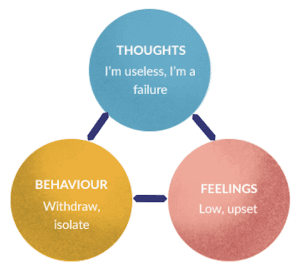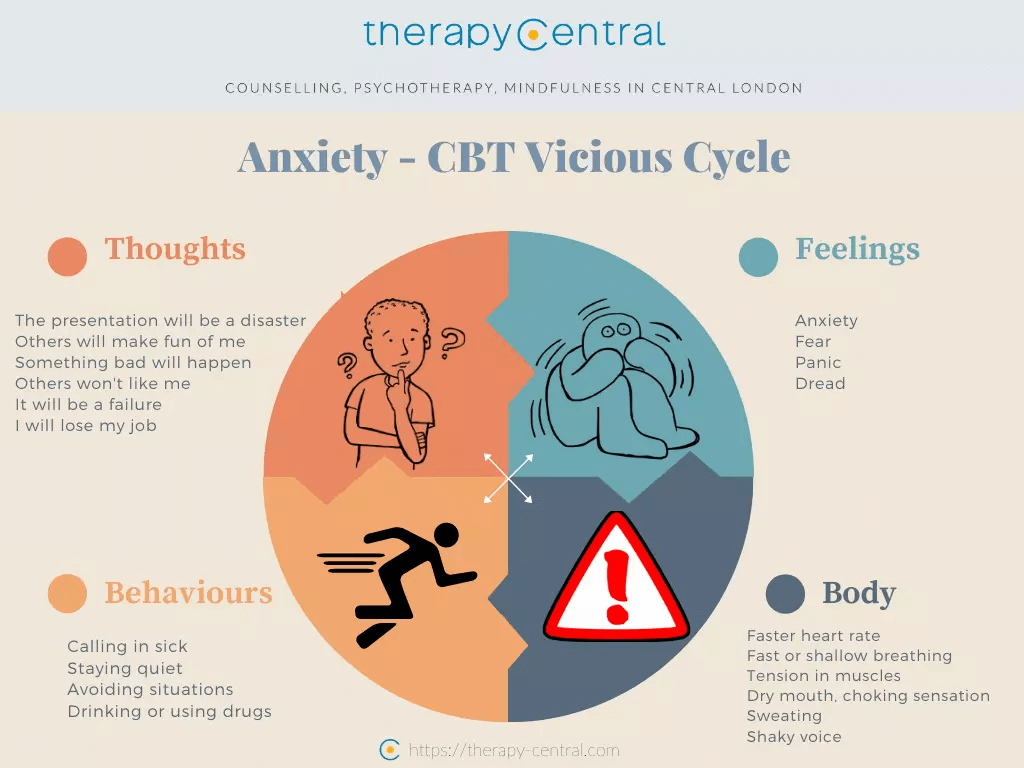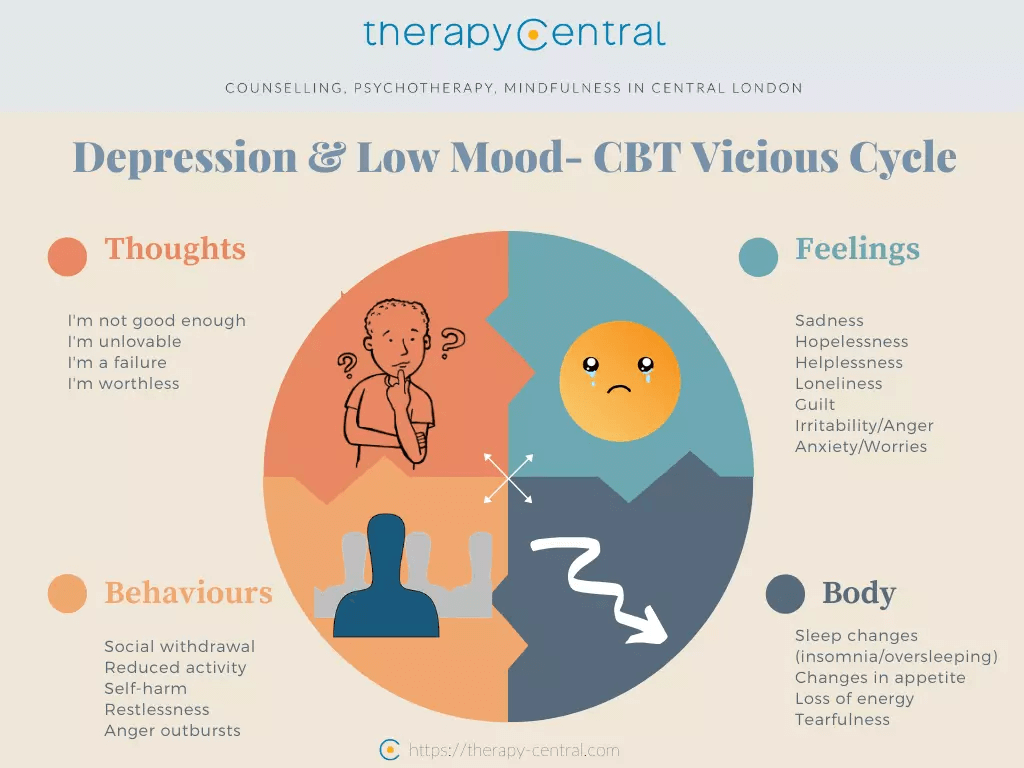
Cognitive Behavioural Therapy (CBT) is a common and effective therapy approach for a range of difficulties. It involves helping you to gain a good insight into specific difficulties and what is maintaining them. It also involves learning various coping strategies to help you address problematic thinking and behavioural patterns in order to improve the difficult feelings you are facing. This will stop you from being held back by your emotional difficulties and from doing what you want to be doing. Eventually, whether you’re struggling with mood, anxiety, stress or relationship issues, this process will help you to live a more satisfying and meaningful life! Read through to learn more about CBT. Get in touch for CBT Therapy in London today.
CBT suggests that an interlink exists between our thoughts, feelings, behaviours and physical sensations. Therefore, if one aspect is negative/unpleasant/unhelpful, then this has a knock-on negative effect on the other aspects thus forming a vicious cycle. The diagram below represents an example of a negative vicious cycle of anxiety. CBT helps you to gain a good understanding of your difficulties by identifying the vicious cycles you experience.

In the example above, we’re feeling anxious about having to give a presentation at work. The negative thoughts that appear lead to difficult emotions (anxiety, fear, etc.) and unpleasant physical sensations. As a response to that we decide to not show up at work and avoid the presentation. Unfortunately however, this behavioural response (known as ‘avoidance’) keeps us in a vicious cycle. When working in CBT, ‘Calling in sick’ would be seen as an unhelpful behaviour as, although it allows us to calm the anxiety feelings, it reinforces negative thoughts about ourselves (such as “I am a failure” or “I am a terrible presenter”). The reinforcement happens because the avoidant behaviour (calling in sick), doesn’t allow us to test the validity of our thought, leaving it unchallenged. CBT involves finding ways to breakdown such vicious cycles. As the name suggests, CBT aims to do this mainly by addressing cognitive processes (or thinking patterns) and behaviours (or actions).
In terms of cognitive processes, CBT helps you to identify thinking patterns that you have developed that, although may have served you well at some point in your life, may now be unhelpful. Your CBT therapist will explore with you how to address unhelpful thinking patterns which can alleviate difficult emotions and help you to make choices that are helpful for you.
Regarding the behavioural element of CBT, this involves exploring with you what your behavioural tendencies are and analysing to what degree these are useful and whether there are any costs in the short and long term. Together with your CBT therapist, you will determine whether it would be helpful for you to adjust some of your behavioural tendencies, particularly those that arise during difficult and emotive situations. Your CBT therapist will thus help identify and change such unhelpful behaviours.
CBT can help people with a range of difficulties including:

It is true that CBT is often focussed on the present moment. However, it can be highly valuable to explore your past and the influence this has on your present emotional struggles, beliefs and behavioural patterns. Therefore, in therapy it can be fruitful to spend time exploring your past and this can be done in CBT with your CBT therapist.
CBT is also often deemed to be a structured therapy wherein:
Some people like this more structured CBT approach. In this case our CBT therapists can deliver therapy in a more structured way. However, others prefer for the therapy to be less structured i.e. to have less focus on goals and agenda items but rather the conversations are more free-flowing and organic. CBT can still be delivered in this less structured way. Whatever your preference, your CBT therapist can adapt the therapy to suit you.
Perhaps you have had CBT in the past and it felt that too much “homework” was set. You may not have liked this aspect of CBT as:
CBT therapy can indeed involve collaboratively setting tasks, or “homework”, at the end of sessions which you practice between sessions. For example, you may agree with your CBT therapist to practice a coping strategy between sessions that you have just learnt in a session. This can sometimes involve keeping records.
Some people like this approach as they feel they are taking action to make changes. However, other people dislike this aspect of CBT maybe due to some of the reasons outlined above. If you do not like the idea of setting tasks or “homework” this will not be enforced upon you at Therapy Central! However, to make the most of therapy it is often helpful to reflect upon the discussions you had in therapy between your sessions. It is natural over the course of therapy to discuss with your therapist things that you wish to work on outside of therapy and it is helpful to make a start on this during the period you are receiving therapy whilst you have the support of your therapist. However, this does not need to be given the strict term of “homework”.
If you are struggling with emotional or physical health difficulties, they are having a significant impact upon your life and you feel stuck, now is the right time for you to receive therapy. We can help you to decide if CBT could be a good therapy approach for you to help you fight off those demons.
As a rule of thumb, CBT is right for you if you are willing to:

As one of the most evidence-based approaches to psychotherapy and counselling, CBT is a very popular choice these days. Costs per session can vary greatly between practitioners and clinics. However, at Therapy Central CBT will cost just as much as any other approach. We believe that therapy should not a be privilege and thus our fees are among the most competitive in Central London. CBT (self-funded) will cost a maximum of 95£ per 50-minute session. See a full list of fees, including discounted rates here.
We regularly deliver CBT for clients who wish to use their private healthcare insurance cover to pay for their sessions. AXA PPP, AVIVA, CIGNA, WPA and VITALITY, are amongst our insurance partners. Visit our Fees & Insurance page for more information about using your private healthcare insurance to cover your CBT sessions.
For some people it is helpful for therapy to be largely based upon CBT. However, for others it is more helpful for elements of CBT to be integrated into therapy alongside elements from other approaches. An example of this is that in therapy your therapist may help you to understand your difficulties from the CBT perspective by looking at the links between your thoughts, feelings, behaviours and physical sensations. You may then be introduced to CBT coping strategies as well as coping strategies drawn from other therapy approaches to help you breakdown the vicious cycles you experience. You can discuss with your therapist at Therapy Central whether it is more helpful for therapy to be solely based upon CBT or whether a more integrative approach would be better for you.
As outlined in other sections on this page, our therapists at Therapy Central work in a flexible way. Therapy can be structured or not be very structured, homework can be or not be explicitly set – it all depends on your needs and preferences.
Get professional CBT therapy in London today. Contact us for a free 15 min consultation with a CBT Therapist to see if our help would fit your needs. You can also get in touch via email at info@therapy-central.com or call us at (+44) 020 348 82797.
Our comfortable and confidential therapy rooms are conveniently located 3 min walk from Oxford Circus station, in Central London (see map below). Change starts with Talking!
Learn more:
Issues we work with at Therapy Central
Tips to deal with Anxiety – Blog post
NHS info on CBT
Dr. Amy Smith, Counselling Psychologist
Dr Raffaello Antonino, Clinical Director, Counselling Psychologist
References:[1] Hoffman et al. (2012). The Efficacy of Cognitive Behavioral Therapy: A Review of Meta-analyses. Cognitive Therapy Research. 36, 427-440.
[2] David et al. (2018). Why Cognitive Behavioral Therapy is the Current Gold Standard of Psychotherapy. Front Psychiatry. 9: 4.